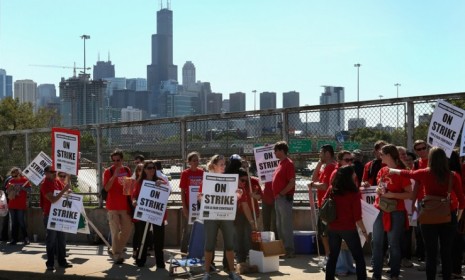Why Chicago teachers are striking: A guide
A union battle in the Windy City has exploded onto the national stage, with implications for the future of organized labor and the presidential race

A free daily email with the biggest news stories of the day – and the best features from TheWeek.com
You are now subscribed
Your newsletter sign-up was successful
More than 26,000 teachers in Chicago are on strike for a second day, following a breakdown of negotiations between the city's powerful teaching unions and Mayor Rahm Emanuel. The strike has shuttered schools across the city — leaving some 350,000 students without class to go to — and "is shaping up to be one of the most important labor disputes in years," says Dylan Matthews at The Washington Post, with a potentially enormous impact on the future of organized labor, which has become an increasingly embattled political force. The fight also just so happens to fall in the midst of a closely fought presidential race that has featured a fierce debate over the size and role of government. Here, a guide to the strike and its implications:
Why are the teachers striking?
The unions oppose Emanuel's demands for a new contract. Emanuel wants teachers to be evaluated under a new system that relies heavily on the results of standardized testing rather than tenure. Emanuel also wants to lengthen the school day, while replacing a scheduled 4 percent pay increase for 2012 with a gradual 16 percent salary bump spread out over four years. Emanuel argues that the reforms will weed out bad teachers, while helping to reduce the Chicago school system's $665 million deficit.
The Week
Escape your echo chamber. Get the facts behind the news, plus analysis from multiple perspectives.

Sign up for The Week's Free Newsletters
From our morning news briefing to a weekly Good News Newsletter, get the best of The Week delivered directly to your inbox.
From our morning news briefing to a weekly Good News Newsletter, get the best of The Week delivered directly to your inbox.
Why do teachers object to Rahm's plan?
They say that they can't be held accountable for how their students perform on tests. In teachers' view, when it comes to poor academic performance, "the main problem is poverty," not bad teachers, say Stephanie Simon and James B. Kelleher at Reuters. "They say their students do poorly because they're hungry, because their lives are chaotic, because they don't have the eyeglasses they need or quiet places to do their homework." Educators believe that the focus on teacher performance is not only misguided, but "a brazen attempt to shift public resources" to charter schools, which are publicly funded, privately run, and largely non-unionized.
What do teachers' critics say?
They point to a broken school system that is badly underperforming in comparison with the national average. They also say Chicago teachers — who on average earn $75,000 a year, with decent health benefits and a pension — shouldn't be rejecting a 16 percent pay increase during a time of economic hardship and wage stagnation. "What conditions, exactly, make them think that this is a good time to ask for so much more money?" says Megan McArdle at The Daily Beast.
A free daily email with the biggest news stories of the day – and the best features from TheWeek.com
What is at stake for unions?
"If the famously feisty Mr. Emanuel wins this confrontation," says Steven Greenhouse at The New York Times, "he could set the table for a major setback for teachers' unions nationwide." Proponents of education reform in other cities could jump on Emanuel's victory to rein in their teachers' unions. The Chicago unions are also taking a huge political risk by staging such a high-profile battle. Public-sector unions already face active hostility from Republicans, as well as ebbing enthusiasm from their Democratic allies, and the fight could further alienate them if it cements the impression that teachers are the main impediments to education reform, and that they care far more about their welfare than that of the children they're supposed to teach.
What do the presidential candidates say?
Mitt Romney has blasted the teachers groups, and essentially called President Obama a union stooge. But it's much more complicated than that. Emanuel, after all, is Obama's former chief of staff, and Obama's education secretary, Arne Duncan, pioneered the charter-school reforms in Chicago that the teachers' unions oppose. The Obama administration's main education initiative, the Race to the Top program, promotes charter schools and sees ineffective teachers as a central problem to education reform. No wonder then that the White House doesn't have much to say about the strikes. Obama "has not expressed an opinion or made any assessment about this particular incident," said White House Press Secretary Jay Carney.
Sources: The Chicago Tribune, The Daily Beast, Los Angeles Times, The New York Times, Reuters, The Washington Post
-
 Samurai: a ‘blockbuster’ display of Japanese heritage
Samurai: a ‘blockbuster’ display of Japanese heritageThe Week Recommends British Museum show offers a ‘scintillating journey’ through ‘a world of gore, power and artistic beauty’
-
 BMW iX3: a ‘revolution’ for the German car brand
BMW iX3: a ‘revolution’ for the German car brandThe Week Recommends The electric SUV promises a ‘great balance between ride comfort and driving fun’
-
 Munich Security Conference: a showdown between Europe and Trump?
Munich Security Conference: a showdown between Europe and Trump?Today’s Big Question Report suggests European leaders believe they can no longer rely on the US for military support – but decoupling is easier said than done